Nader will be giving his lecture Outside In at the University of Nevada, Las Vegas School of Architecture on October 20, 2014 at 6pm.
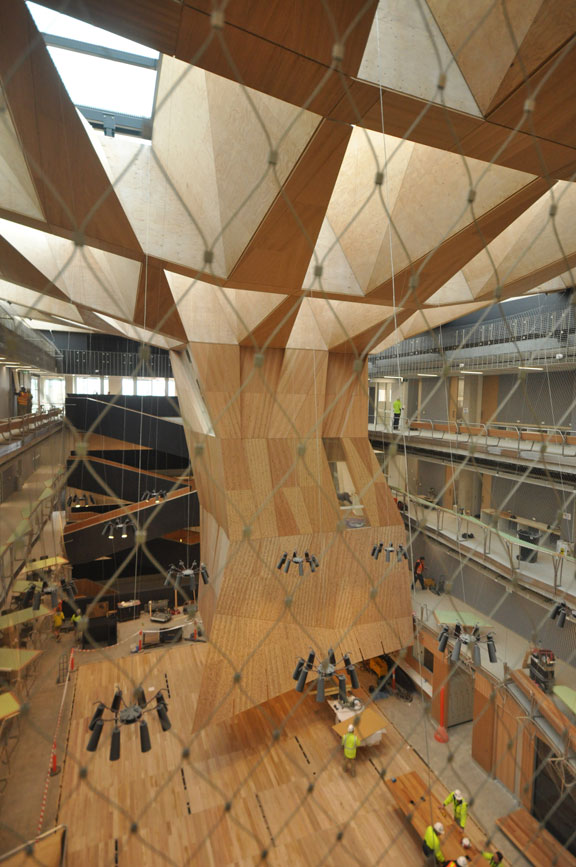
Comments Off on Nader lectures at UNLV: ‘Outside In’
Nader will be giving his lecture Outside In at the University of Nevada, Las Vegas School of Architecture on October 20, 2014 at 6pm.

Comments Off on Nader lectures at UNLV: ‘Outside In’
In the summer of 2009 John Wardle Architects invited us (then office dA) to collaborate on a open design competition for University of Melbourne’s Faculty of Architecture Building and Planning. Through the competition the University’s mission was to select a design team rather than a completed design. So our trans-global collaboration extended through an extensive re-evaluation of program and budget, complete redesign, documentation and construction. Today, 5 short years later, delivered by Brookfield Multiplex 6 months ahead of schedule and with a 6 star Greenstar rating, the building is nearly complete.

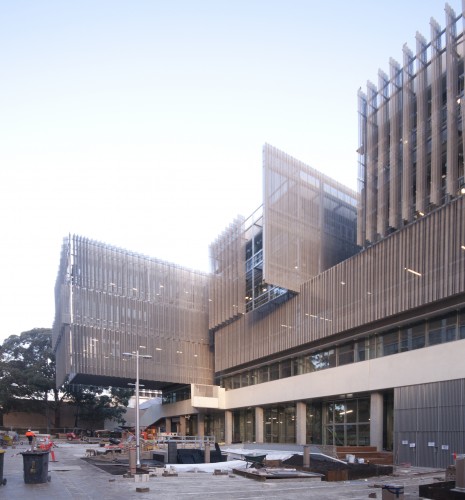
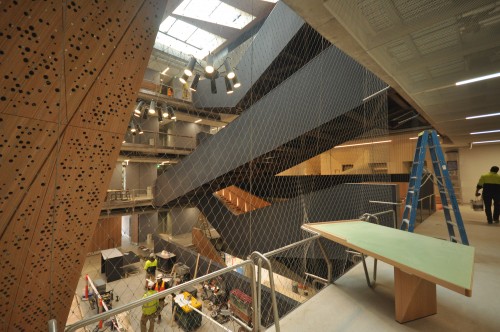
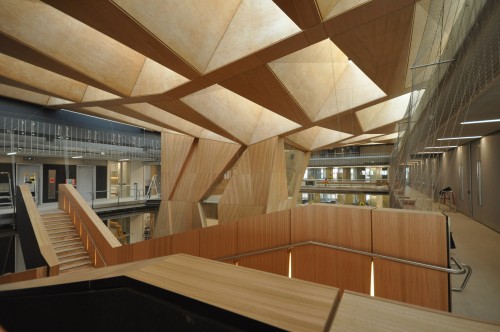
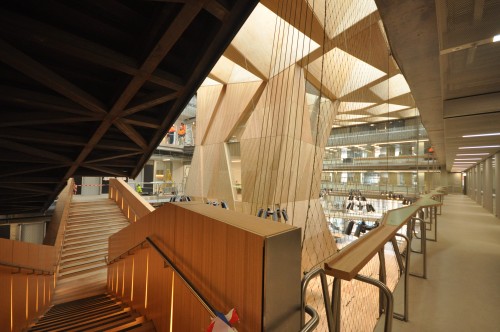
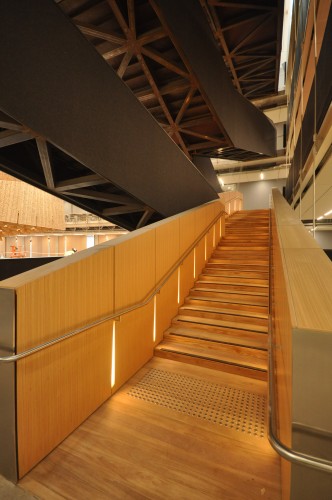
Comments Off on Almost done……..
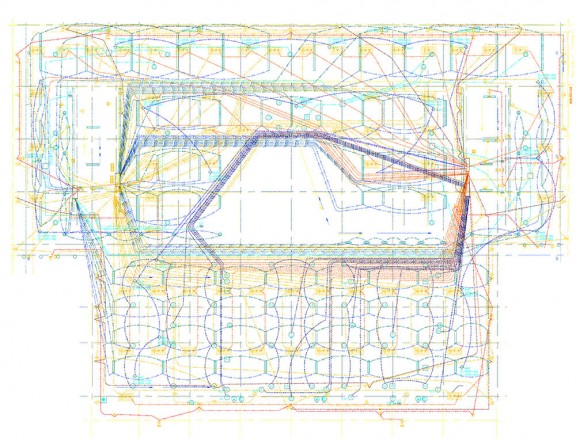
All slab-bourne conduit serving level 03/level 02 ceiling electrical, IT and A/V devices. (courtesy Mulvey Banani Intl Inc.)
These are images of the electrical nervous system to be embedded in the concrete slabs supporting the graduate design studios at the new U of Toronto Daniels Faculty of Architecture. Lines shown in cool/blue tones indicate conduit that will serve devices mounted to or embedded within the exposed concrete ceilings below. Lines shown in warm tones indicate conduit that will serve floorboxes at the top of the floor slab. If we are lucky, we will be able to embed/conceal all of these conduits within the congested 12 inch thickness of concrete also containing hydronics for radiant cooling/heating, reinforcing bar, and voids that will reduce the slab’s dead load self weight.
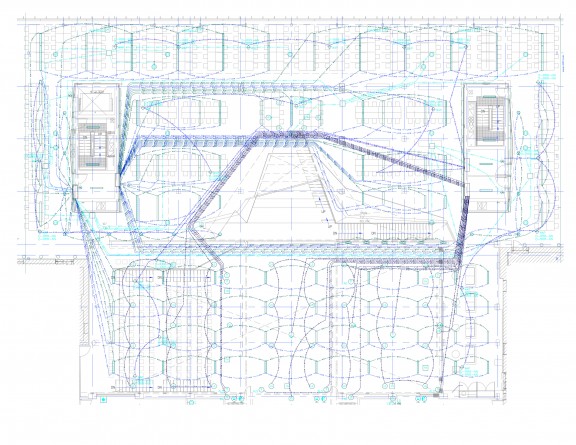
There are two major bottlenecks that correspond roughly with the locations of the “spinal cord/brain”: the electrical and IT closets located at the the northeast and northwest stair cores, respectively. From these locations, conduit fan out in all directions. However, the local bottlenecks are exasperated by a large, floor-through penetration right at the center of the plan, which corresponds with a large amphitheater sunken to the level below. We will try to mitigate the need for additional slab thickness at areas of congestion by omitting slab voids in those locations.
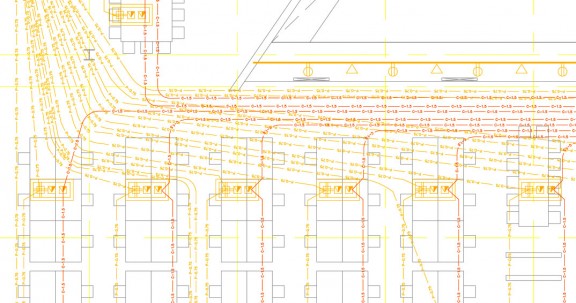
Detail of data (orange) and electrical (yellow) conduits serving cast-in floor boxes at the graduate design studio level. (courtesy Mulvey Banani Intl Inc.)
Comments Off on SLAB XRAY: NERVOUS SYSTEM
The Historic Facade of the Bank of New South Wales is an essential element of, what is lovingly called, The Concrete Lawn. In the competition stage teams struggled with whether to relocate it or to integrated it into the new FABP building. We chose the latter.
JOSEPH REED’S BANK OF NEW SOUTH WALES FACADE PRE-DEMOLITION
APRIL 2013 – HISTORIC FACADE BRACED
JULY 2013 – EVERYTHING BUT JOSEPH REED IS DEMOLISHED
DEC 2013 – PRIMARY STRUCTURE ERECTED
JUNE 2014 – DRYWALL FRAMING
JULY 2014 – DRYWALL ALMOST COMPLETE….
JULY 2014 – FIRST COAT
Comments Off on Joseph Reed Gets a Face Lift
NADAAA has always been dedicated to advancing construction and green development. We are proud that two our projects, University of Melbourne FABP and University of Toronto DFALD, are receiving Green Good Design Awards for 2014.
Comments Off on Green Good Design Awards
Another dispatch from the ongoing Phase I renovation of Knox College at 1 Spadina Crescent for the University of Toronto Daniels Faculty of Architecture, Landscape and Design. Structural masonry retrofit work is costly, and NADAAA has endeavoured to avoid it wherever possible in the project. Nevertheless, there were several locations where the requirements of the program, security or new building services have necessitated masonry removal and the installation of steel lintels to transfer loads bearing down from above. Depending on the lintel’s span/size of opening below, the shoring work required to stabilize loads above can be complex and time-consuming.
ABOVE RIGHT: NADAAA rendering of the new library study room, complete with new masonry opening to suit a service counter and clear site-lines from the adjacent library workroom, as required by the client’s program. (see rectangular opening adjacent to the existing arched doorway).
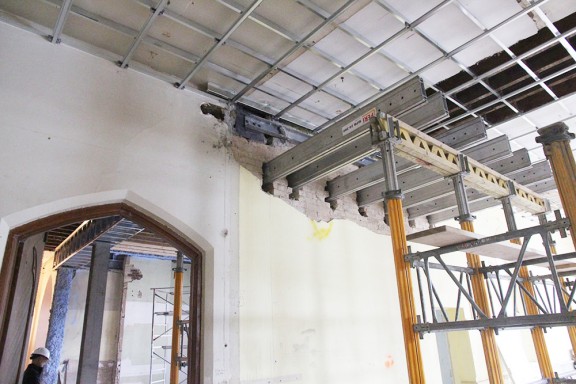
ABOVE: Needle shoring was required to stabilize the loads above for work to proceed: masonry demolition and installation of the permanent steel w-section lintel for this 3.5 meter wide opening. “Needling” gets its name from the (in this case aluminum) structural sections penetrating the masonry, and resting on shores at either side of the wall.
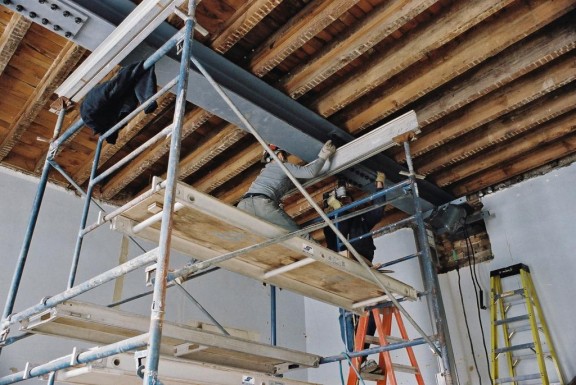
ABOVE: Inspection of the building’s original sawn timber joists by a wood specialist uncovered the need to reinforce the floor assembly to achieve code compliance in many locations. This was accomplished either by sistering steel c-channels to each individual joists (thereby maintaining maximum ceiling clearance), or through the installation of a new steel girder below mid-span of the joists, as shown above. (photo courtesy Peter MacCallam / The Daniels Faculty)
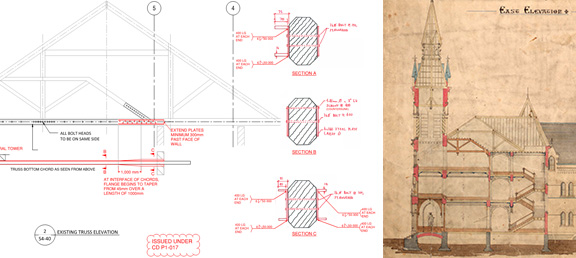
ABOVE LEFT: The wood consultant also identified the need for reinforcement of two monumental timber trusses that support the attic and roof above the central block on the top level. Entuitive, our structural engineer, provided steel plate strapping, bolted to either side of the cracked bottom timber cords in response to the wood consultant recommendations. (sketches courtesy Entuitive Corporation). ABOVE LEFT: An original building section drawing dated 1873 shows the referenced space and trusses, which flank the central masonry tower. (courtesy U. of Toronto archive.
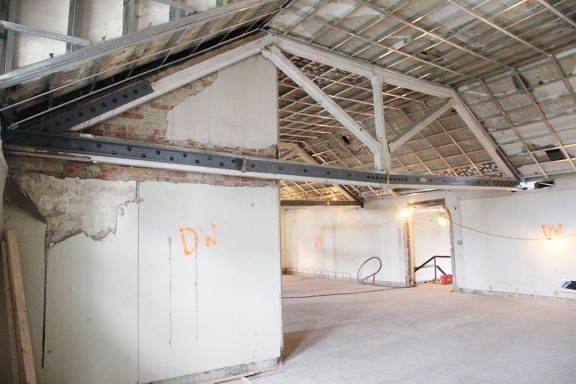
ABOVE: The timber trusses, after installation of steel plate strapping. These will be painted a uniform color. The clear span allows this feature space to support various configurations of graduate studios and student exhibition/crit space over the course of the phased project.
Comments Off on MASONRY SURGERY + TIMBER PROSTHETICS
Check out the time-lapse construction video of University of Melbourne’s Faculty of Architecture, Building and Planning from January 2013 – April 2014. Only a couple more months until we get to see the completed building.
Additional videos from different cameras on-site are also available on the university’s website.
Comments Off on Construction Update in 5 Minutes
Phase I renovation of Knox College at 1 Spadina Crescent is progressing for the University of Toronto Daniels Faculty of Architecture, Landscape and Design. Currently, demolition, restoration and structural work is underway at the former original Convocation Hall, which forms the east wing of the neo-gothic structure. The monumental triple-height volume of the hall had been subdivided into three floors during 19040’s era alterations to suit the needs of the former Connaught laboratories. The current renovation calls for a double-height space to be carved out of the second level, with intent to at least partially reinstate the grandeur of the original hall.
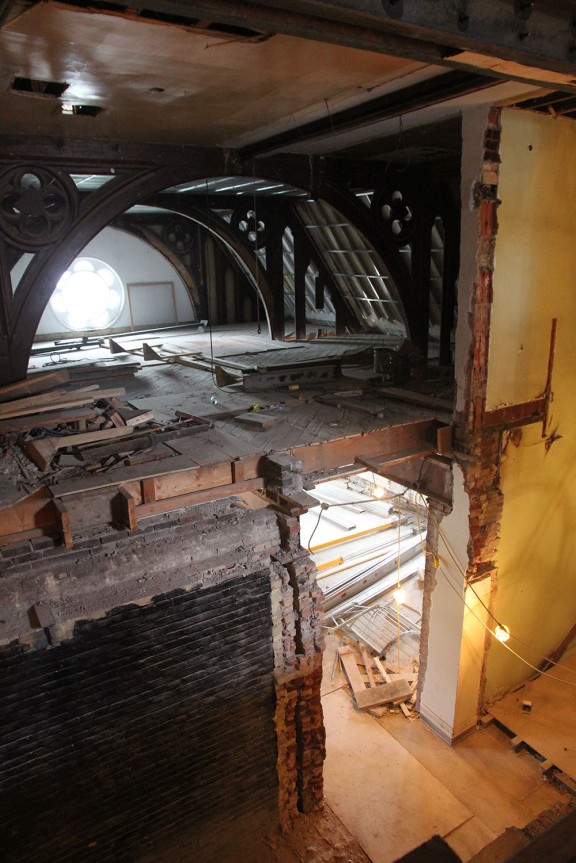
ABOVE: Ongoing demolition and structural retrofit to the fomer Convocation Hall at Knox College / 1 Spadina Crescent. The original timber trusses have been exposed at level 03 as seen beyond. The Level 03 floor structure in the foreground has been removed in preparation for shoring to support a new composite mezzanine floor. Steel moment frames have been installed where some of the original timber trusses were removed. The moment frames serve to stabilize lateral forces on the building while also retaining the open floor clearance at the level 03 mezzanine. The level 03 floor seen beyond in the image above will be removed after the mezzanine slab is poured. In the foreground, walls added in the 1940s that supported storage vault rooms and a stair are being removed.

ABOVE LEFT: Original sectional drawing of the Knox college convocation hall (1873). ABOVE RIGHT: The convocation hall in its original condition. The timber hips shown below the timber trusses were removed when the hall was subdivided into three floors.
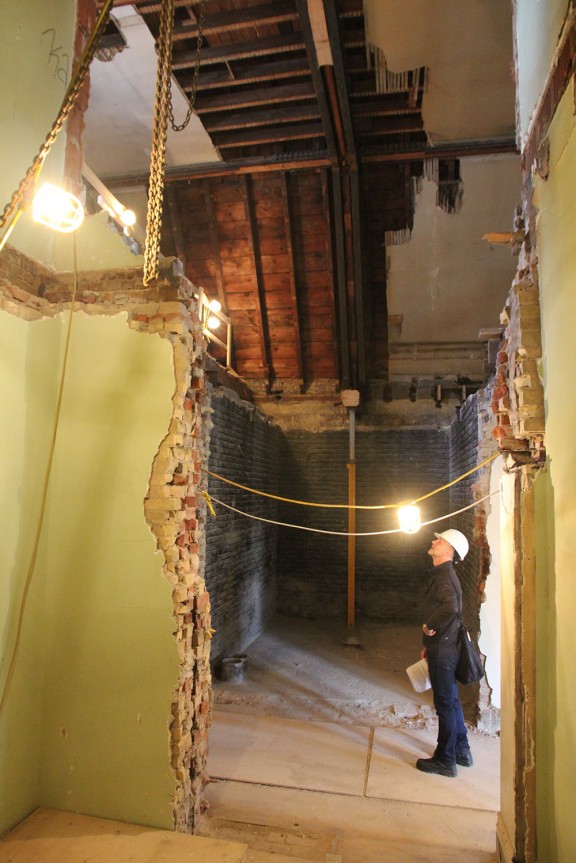
ABOVE: this image was taken from level 02, below the floor structure that was demolished in preparation for the new level 03 mezzanine structure. This space was also flanked by a stair and a series of storage vaults, both of which have been removed. The bottom cord of the original timber truss in this zone has truncated/sawn in this location, and a pair of c-channel moment frames have been sistered to either side of the upper cord.
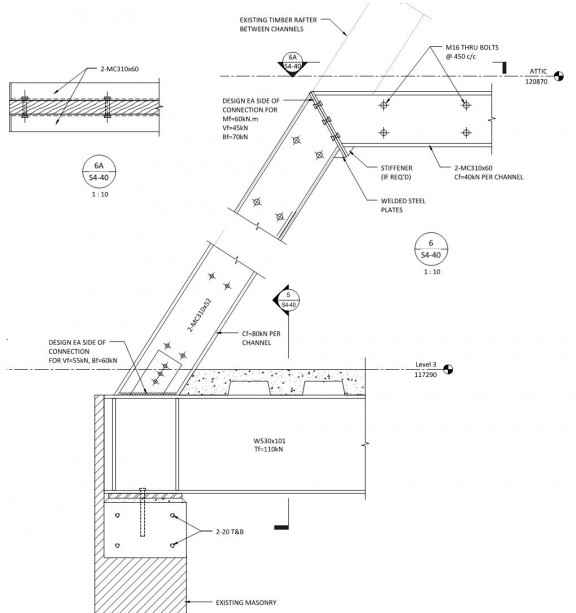
ABOVE: A structural detail indicating the retrofit c-channel moment frames, and the new composite mezzanine slab. (courtesy Entuitive Corporation)
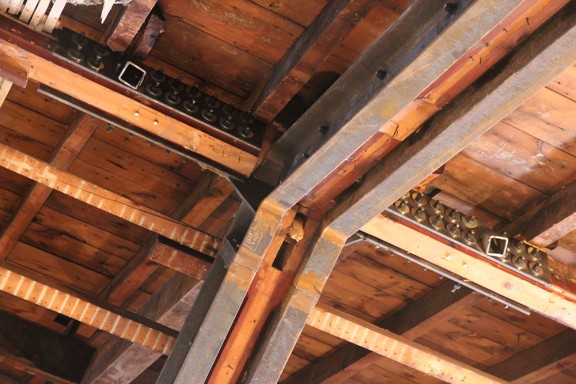
ABOVE: A detail of the original timber truss top cord, with sistered c-channel moment frames installed at either side.
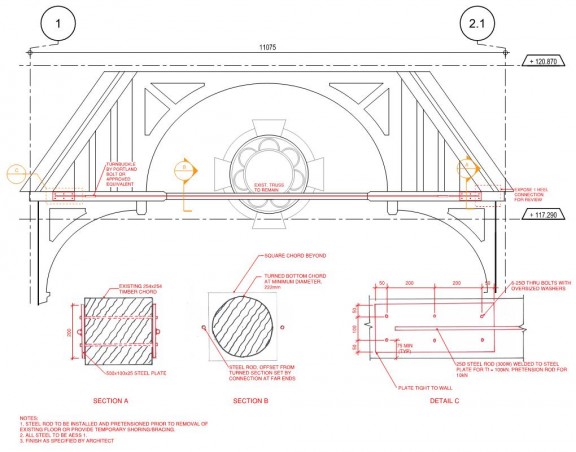
ABOVE: Sketch indicating retrofits to repair damaged timber trusses at the east end of the former convocation hall. The original trusses will be featured in this location upon removal of the existing level 03 wood floor structure. This sketch documents steel tension rods that have been installed to relieve forces on the existing timber ties (which have sustained cracks/damage over the years). (courtesy Entuitive Corporation)
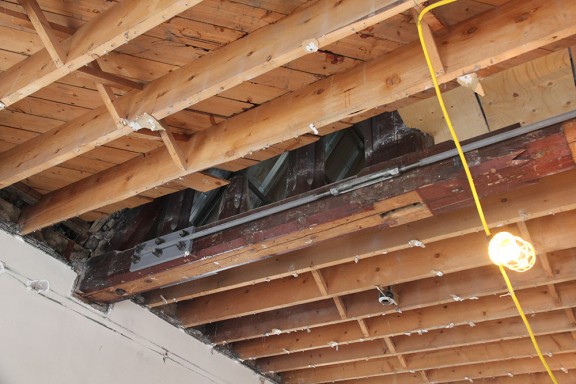
ABOVE: Detail showing steel rod reinforcement installed to reinforce the bottom ord of the original timber trusses. The level 03 floor structure on either side will be removed to open a double-height space, reminiscent of the original convocation hall. Original hip support to the bottom of truss had been removed at the time of previous renovation.
Comments Off on Reinstating the Convocation Hall
NADAAA recently completed a project at Cornell University involving the modification of seven bridges to prevent accidental or purposeful falling. Each bridge has a unique structure, travel patterns and responds to specific conditions imposed by the landscape and built environments at each end. Common to all of the bridges is the strategic use of high tensile strength wire mesh, from Jakob Rope Systems, that provides the necessary safety measures while maintaining unobstructed views to the scenic landscape. The success of the project was greatly due to the collaborative efforts of the client, design team, contractor and manufacturers.
From the before and after photos of the suspension bridge, you can see the improvements to user experience and functionality.
After
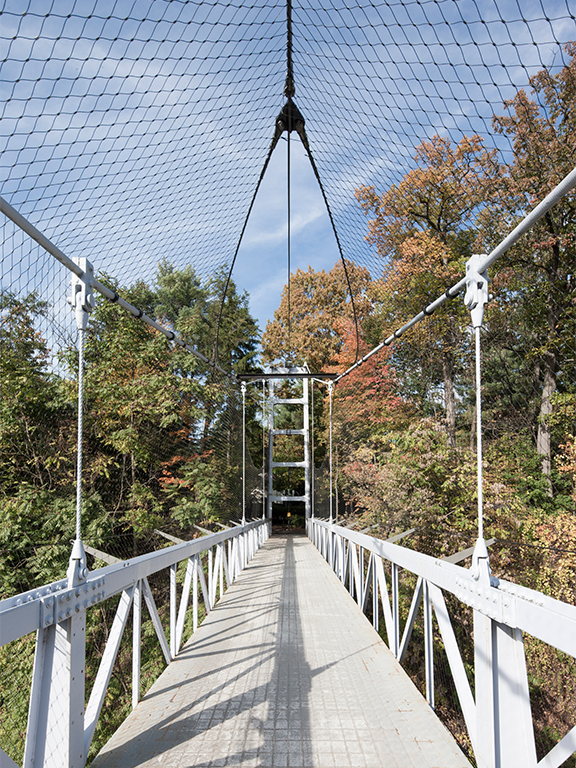
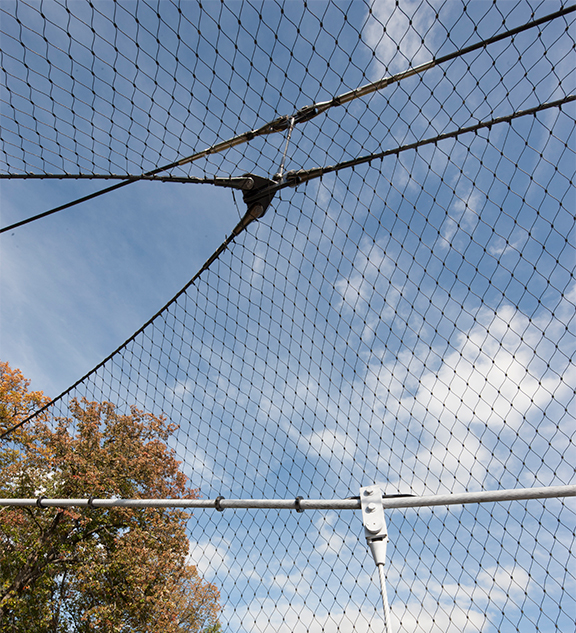
Information on the wire mesh and project background is also currently featured on Jakob’s website.
Comments Off on Bridges at Cornell
New Hampshire Retreat receives an On the Boards citation for the 2014 Residential Architect Design Awards.
Comments Off on 2014 RADA Awards